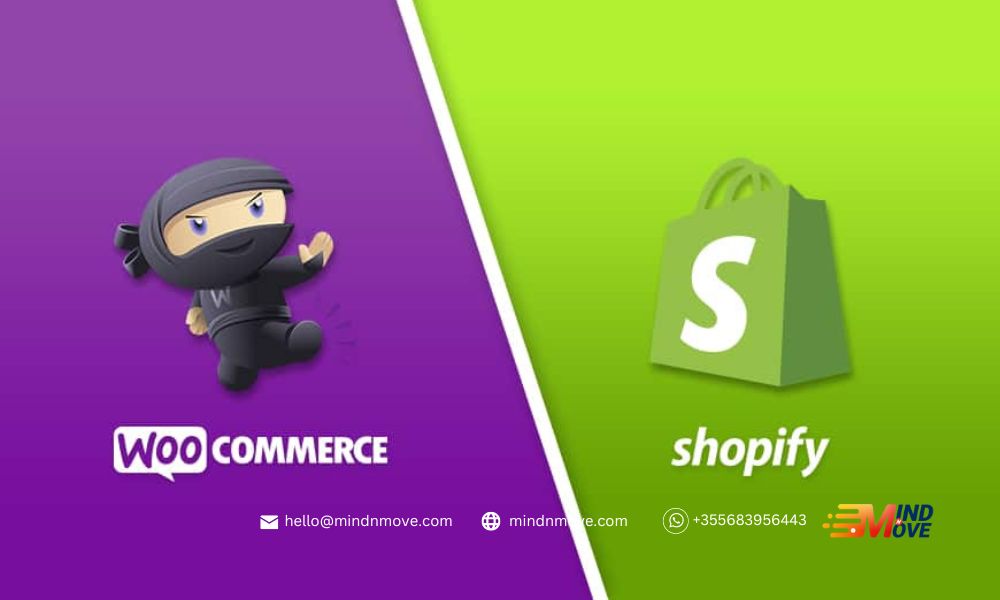Are you planning to launch an online store but struggling to choose the right ecommerce platform? There are many options available, but two of the most popular ones are Shopify and WooCommerce. Both have their pros and cons, so it’s essential to understand the differences to make an informed decision. In this article, we’ll compare Shopify and WooCommerce to help you decide which one is better for your business.
What is Shopify?
Shopify is a cloud-based ecommerce platform that allows businesses to create an online store and sell their products. It’s a fully-hosted solution, meaning that you don’t need to worry about hosting, security, or maintenance. Shopify offers a user-friendly interface and provides numerous themes and templates to customize your store’s design. It also offers a wide range of features, including inventory management, order tracking, payment processing, and more. Shopify is an excellent choice for businesses of all sizes, from small startups to large enterprises.
What makes Shopify stand out among other ecommerce platforms?
Shopify is a fully-hosted ecommerce platform, which means that it takes care of all the technical aspects of running an online store. From hosting to security and maintenance, Shopify provides a hassle-free experience for businesses of all sizes. It also offers a wide range of features, including inventory management, order tracking, payment processing, and more, making it a one-stop-shop for all your ecommerce needs.
Is Shopify suitable for small businesses?
Absolutely! Shopify is an excellent choice for small businesses that are just starting with ecommerce. Its user-friendly interface and drag-and-drop design make it easy to set up and customize your store without any coding knowledge. Shopify also offers a range of pricing plans to fit any budget, starting from just $29 per month for the Basic plan.
Can Shopify handle large volumes of traffic and sales?
Yes, Shopify is built to handle high volumes of traffic and sales. It’s a scalable platform that can handle millions of visitors per month without compromising on performance or speed. Shopify also provides 24/7 support and dedicated servers for large enterprises to ensure a smooth and uninterrupted shopping experience for customers.
Is it easy to integrate Shopify with other tools and apps?
Yes, Shopify offers a wide range of integrations with popular tools and apps, such as Facebook, Google Analytics, Mailchimp, and more. It also has a robust API that allows businesses to build custom integrations with their favorite tools and apps. Integrating Shopify with other tools can help businesses streamline their workflow and increase efficiency.
Does Shopify provide security and fraud prevention?
Yes, Shopify takes security and fraud prevention seriously. It provides SSL encryption, PCI compliance, and regular security updates to ensure that all transactions and customer data are safe and secure. Shopify also offers fraud analysis and chargeback protection to prevent fraudulent transactions and protect businesses from financial loss.
What is WooCommerce?
WooCommerce is a free, open-source ecommerce plugin for WordPress. It allows businesses to turn their WordPress website into an online store. WooCommerce offers a wide range of features, including product management, order tracking, and payment processing. It also provides numerous plugins and themes to customize your store’s design. However, unlike Shopify, WooCommerce requires a hosting account and a domain name, which can be more complex to set up for non-technical users.
Shopify vs WooCommerce: Feature Comparison
Both Shopify and WooCommerce offer a wide range of features to create and manage an online store. Here’s a detailed comparison of their features:
Ease of Use
Shopify is designed to be user-friendly and straightforward to use, even for beginners. It offers a drag-and-drop interface, which makes it easy to customize your store’s design without coding knowledge. Shopify also provides an extensive documentation and support system to help you set up and manage your store.
WooCommerce, on the other hand, requires some technical knowledge to set up and manage. It’s a plugin that runs on WordPress, so you need to have a WordPress website to use it. However, once you get the hang of it, WooCommerce can be easy to use and customize.
Design and Customization
Both Shopify and WooCommerce offer numerous themes and templates to customize your store’s design. Shopify has a more extensive selection of themes, with over 70 free and paid options. Shopify themes are also mobile responsive, meaning that they look great on all devices.
WooCommerce also offers a wide range of themes and templates, with over 1000 free and paid options. However, some of them may not be mobile responsive, meaning that you need to test them on different devices.
Payment Processing
Shopify offers its payment processing system, called Shopify Payments. It allows businesses to accept credit card payments directly on their online store. Shopify Payments is easy to set up and use, and it doesn’t charge any transaction fees.
WooCommerce supports multiple payment gateways, including PayPal, Stripe, and others. However, you need to set up and manage each payment gateway separately, which can be time-consuming.
Security
Shopify takes care of security for its users, providing SSL encryption, PCI compliance, and regular security updates. It also offers fraud analysis and chargeback protection to prevent fraudulent transactions.
WooCommerce is secure, but its security depends on the hosting provider you choose. You need to make sure that your hosting provider offers SSL encryption and regular security updates.
Cost
Shopify offers various pricing plans, starting from $29 per month for the Basic plan up to $299 per month for the Advanced plan. It also charges transaction fees ranging from 0.5% to 2% per transaction, depending on the pricing plan.
WooCommerce is free to use, but you need to pay for hosting, domain name, and SSL certificate. These costs can add up, especially if you want to use premium plugins and themes.
Which Ecommerce Platform Should You Choose?
Choosing the right ecommerce platform depends on your business needs and budget. If you’re a small business with limited technical knowledge, Shopify may be the better option. It’s easy to use, secure, and provides a range of features to manage your online store. Shopify also offers excellent customer support and a 14-day free trial to test its features.
However, if you’re a larger business with technical knowledge and want more control over your online store, WooCommerce may be the better option. It’s free to use, customizable, and provides more flexibility than Shopify. However, you need to pay for hosting, domain name, and SSL certificate, which can be more expensive in the long run.
Conclusion
In conclusion, both Shopify and WooCommerce are excellent ecommerce platforms with their pros and cons. Shopify is ideal for small businesses that want an easy-to-use platform with excellent customer support, while WooCommerce is better suited for larger businesses that want more control and flexibility. Consider your business needs, budget, and technical knowledge to make the right choice for your online store.
Start now for only $1




